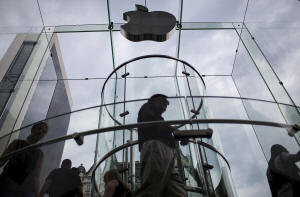|
According to a filing on Wednesday in federal court in San Jose,
California, Apple and the plaintiffs have agreed on material
settlement terms after working with a mediator.
They are drafting a formal settlement to be presented to U.S.
District Judge Edward Davila for preliminary approval.
Apple and lawyers for the plaintiffs did not immediately respond
to requests for comment.
The scam involves fraudsters who instill panic or urgency by
insisting by phone that victims buy App Store and iTunes gift
cards or Apple Store gift cards in order to pay for taxes,
hospital and utility bills, bail and debt collection.
Victims are then told to share the codes on the backs of the
cards, despite a warning on the cards that reads: "Do not share
your code with anyone you do not know."
According to the complaint, Apple would typically deposit only
70% of the stolen funds into fraudsters' bank accounts, and keep
30% for itself as a "commission" for knowingly converting stolen
codes into dollars.
Victims likely lost "hundreds of millions of dollars" in the
scam, the complaint said.
The lawsuit covered anyone in the United States who from 2015
through July 31, 2020 bought gift cards redeemable on iTunes or
the App Store, provided codes to fraudsters, and did not receive
refunds from Apple.
In June 2022, Davila rejected Apple's bid to dismiss the
lawsuit.
He said the plaintiffs sufficiently alleged that the Cupertino,
California-based company's effort to disclaim liability, even
after victims claimed they were scammed, was unconscionable.
The case is Barrett et al v Apple Inc et al, U.S. District
Court, Northern District of California, No. 20-04812.
(Reporting by Jonathan Stempel in New York; Editing by Daniel
Wallis)
[© 2023 Thomson Reuters. All rights
reserved.]
This material may not be published,
broadcast, rewritten or redistributed.
Thompson Reuters is solely responsible for this content.

|
|




